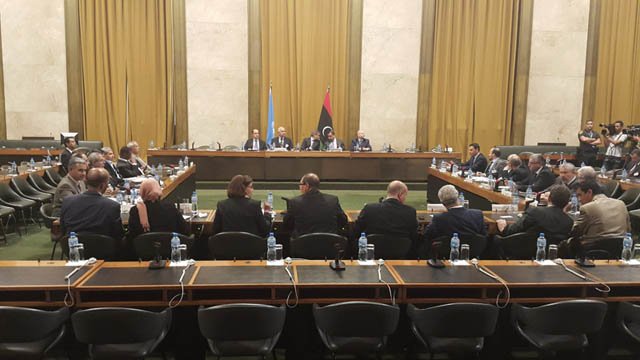By Michel Cousins.

Geneva, 13 August 2015:
Two days of Libya Dialogue talks finished yesterday evening in Geneva in what was essentially a . . .[restrict]bid to bring the Tripoli-based General National Congress (GNC) back on board the UN-brokered peace negotiations. The GNC had boycotted the process for over a month because of objections to the Draft agreement presented by UN Special Envoy Bernardino Leon at the end of June. They initially centred on the Draft notably the powers of the proposed State Council, 90 of whose 120 members are to be drawn from the GNC.
The GNC’s objections now boils down to three points:
- Decisions taken by the HoR since it began in August 2014;
- The appointment by the Beida-based government of heads of parallel sovereign institutions, such as the National Oil Corporation and the Central Bank of Libya; and
- The State Council.
The GNC had demanded that Leon agree to make changes to the Draft if it were to rejoin the Dialogue. This, he informed it, he could not do. The Draft had been approved by all the other delegates last month. But on Sunday, at the last minute, the GNC suddenly decided to send its team to the Geneva session, to see if it would rejoin the process. According to other delegates in Geneva yesterday, it had been given assurances by Leon that its concerns could be addressed in the annexes to the Draft, still to be worked out.
The GNC team returns to Tripoli today, armed with a letter from Leon, to explain the situation and await a vote on whether it can rejoin the next set of talks, to be held again in the Moroccan resort of Skhirat.
These will work out and approve the annexes that will also contain the names of the new prime minister, two deputy prime ministers and other members of the government.
Leon has said that the whole process has to be finished by the end of the month.
Much of the talk last night among the delegates and the assembled entourage of advisers, UN officials and foreign ambassadors attending the Dialogue was whether the GNC would agree to return.
Most were optimistic. “The spoilers in Tripoli are loosing their power”, said one independent delegate, referring to those opposed to the Dialogue such as Abdurrahman Sehelhi, Salah Badi and Abdul Rauf Al-Manaie. “If they couldn’t stop them on Sunday [when the GNC voted to send its team to Geneva], they’re not going to stop them now.” He claimed that the majority of the GNC wanted to rejoin the process.
Others pointed out that the GNC had little option but to accept a return, even though many it members had been afraid for their own safety of agreeing to it.
“If they don’t turn up, we’ll get on with it,” another independent delegate told the Libya Herald. In any event, she added, “it will be done by the end of August”.
Others concurred. Having come this far, it would be good if the GNC remained in the process, but it would continue to decide on a government of national unity either with or without it. “The train will still leave if they don’t get on board,” said one adviser.
All agreed the atmosphere in Geneva had been extremely positive. Delegates were all at the same Royale Hotel and those from both the GNC and the House of Representatives could be seen sitting and talking together without animosity. Party political leaders were also there, including Mohamed Sawan of the Justice and Construction Party, Guma El-Gamaty of the Taghyeer Party and Abdulhakim Belhaj of the Nation Party.
This was noted in a statement about the talks from United Nations Support Mission in Libya (UNSMIL). “The talks were held in a positive atmosphere, with the different parties emphasising the need to set aside partisan agendas and uphold Libya’s higher national interests,” it read, adding that “the parties expressed optimism that the dialogue process was approaching its final stages”.
The statement also referred to the main concern that many at the talks, and other observers, are now expressing – that it will be one thing to pull together a government of national unity but, given the security situation, another for it to go to Tripoli.
“The parties noted the need for urgent progress on the security track of the dialogue process, in parallel to the progress being made on the political front. In this regard, the different political leaderships present at the talks signalled that they would move to encourage relevant security actors to commence consultations with the United Nations Support Mission in Libya and provide their inputs on ways of operationalising the security arrangements outlined in the Libyan Political Agreement,” the statement read.
“The various military groups should have been brought into the process much earlier on,” one HoR delegate said, expressing fears that a military battle in Tripoli was inevitable.
Although formal discussion of who should be prime minister did not figure in the two days of talks in Geneva, various names for prime minister were being bandied around by those there. These included Ahmed Maetig (briefly prime minister designate in 2014), former prime minister Ali Zeidan, former communications minister Osama Siala, Aref Nayed (ambassador to the UAE), Shebani Abuhamouda (ambassador to France) and former NTC member Mohamed Al-Mnifi.
However, Leon is said to have told the HoR that the prime minister and one of the deputy prime ministers would be people that it approves of while the name of the other deputy prime minister would come from the GNC. [/restrict]







